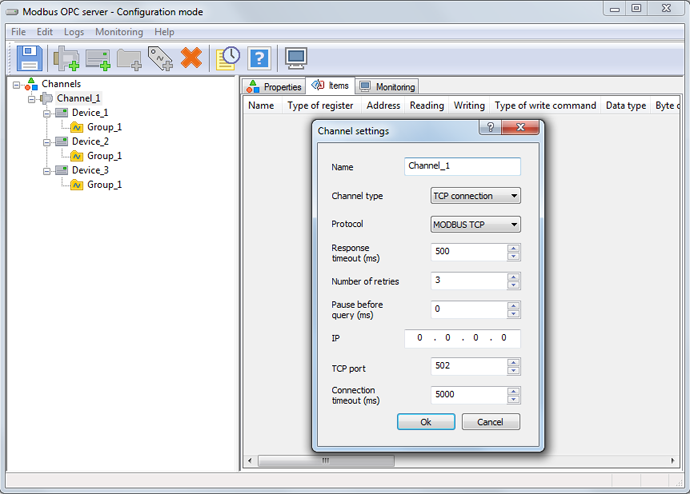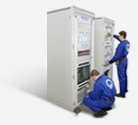MODBUS protocol is a standard protocol developed based on a client-server architecture. This protocol is widely spread and, in fact, has become a standard item for many manufacturers of various devices. The MODBUS protocol is used in many devices, from simple input/output modules to full-featured controllers.
The OPC server provides the OPC clients (any advanced SCADA systems, e.g., SCADA KRUG-2000) with an access to devices, supporting the MODBUS protocol.
To have a trial run of the software product, you can use, absolutely free of charge, 30 tags without any time limit. To handle more than 30 tags, you can use a 30-day fully functional trial period.
To work in full mode, run the software ON THE TARGET COMPUTER and send the registration code and the remaining fields are filled in the registration dialog box at support@krug2000.com. We will send a response letter registration key FOR THIS COMPUTER.
Key functions
- Supported protocols: MODBUS RTU, MODBUS TCP, MODBUS ASCII
- Supported MODBUS functions: 1,2,3,4,5,6,15,16
- Supported communication channels: COM port, TCP connection
- Opportunity to use an extended list of communication channel types (CSD, GPRS, etc.), using the Modem Communication Channel Module special software
- Opportunity to poll tag groups of the device at varying intervals
- Interaction with the OPC clients in accordance with the OPC DA specifications, version 2.05a
- Service operation function (Windows OS Service)
- Group setting of tags
- Configuration import/export in the CSV format (with a report file formatting)
- Ability to survey and view tag values without the OPC client connection
- Ability to operate at a broadcast address
- Ability to emulate tag values
- OPC server operation logging.

Automatic search for connected devices reduces the time required for arranging a hard-wired connection of devices to the computer as well as for configuring the OPC server.
Configuration import/export into the CSV format (with the possibility of its further editing and processing in Excel) significantly accelerates the configuring process.
Polling tag values of the device at varying intervals increases the speed of reading of critical parameters by reducing the frequency of reading of less important (or rarely changing) parameters.
Surveying and viewing tag values without the OPC client connection allows the OPC server to be initially set (parameter register number setting, etc.) without application of any additional software as well as to diagnose potential problems in the automated system development by separating the SCADA level errors and the device survey errors.
Tag value emulation provides the opportunity to debug projects in the upper level systems without any physical access to metering instruments, to emulate critical values for testing upset situations, and to easily create educational projects for different purposes.
System requirements
To be able to run the OPC server, your computer must meet the following requirements:
- Processor Speed - 1.4 GHz or higher
- RAM – minimum 256 MB
- Hard disk free space: minimum 20 MB
- Availability of RS-232 / RS-485 serial interface or interface converter
- Availability of the Ethernet interface
- Windows operating system:
- x86: XP, 7, 8
- x64: 7, 8, Server 2012.


